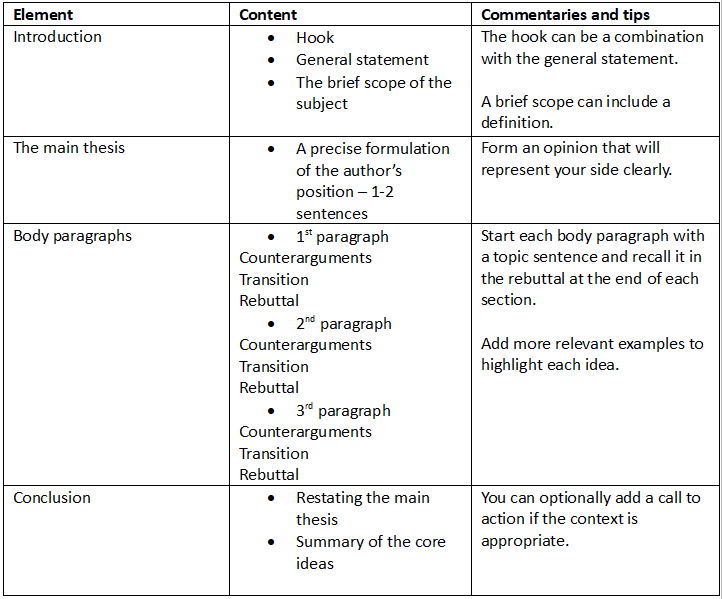How to Write an Argumentative Essay Easily
Here at BuyEssay, we believe that modern students are ambitious and strive to get a quality education. Nevertheless, from time to time, it is not easy to reach ambitious goals alone. To help you out on academic tasks, we created this ultimate guide that will lead you to success in argumentative writing. We will also provide you with a perfect argumentative essay example that exposes all the peculiarities of this paper type. Furthermore, you will get a table with details that would help to make a working argumentative essay outline.

Photo by Darius Bashar from Unsplash
What Is an Argumentative Essay?
An argumentative essay is a paper that is usually written by college and university students on various disciplines, from history to psychology.
This type of paper must defend the particular statements of an author, appealing to actual arguments and facts that support the main idea. An argumentative essay outline has to be built following a prescribed structure to support authors’ views.
Argumentative VS Persuasive – What Is The Difference?
Before we clarify the main steps of argumentative essay writing, let us define some more terms. From time to time, students mess with persuasive and argumentative essays. These papers are almost similar by their structure, but there is a core difference. A persuasive essay appeals to the feelings and subconscious of readers to convince them to join the opinion of the author. At the same time, argumentative essays concentrate on evidence and facts supporting the author’s point of view. The final aim of both essay types is similar – the audience must agree with the author and join his or her side on the essay’s main thesis.
I Preparation stage
State a topic
Go through the rubrics, if any, or simply read instructions from the teacher. If you need to state a topic by yourself, keep in mind to select a debatable subject. Remember that stating argumentative essay topics is tricky, as it must reflect the problematics and, at the same time, not reveal the arguments from the essay’s body. There are several essential criteria for choosing a topic for an argumentative essay. They are:
- relativity to the discipline you study
- actuality and importance
- potential for further research
Research the materials
Depending on the subject and on the discipline, you will engage with various sources. We recommend using as many types of sources as you can find. It would make your argumentative essay detailed and representative. Make sure that the sources you select are credible enough. While conducting research, you will face other research results and opinions. Try to avoid repeating other statements and generate an original one.
Form your opinion before you start writing
It is crucial to develop a solid main thesis that reflects your opinion on the argumentative essay’s problematics before proceeding with the writing stage. Moreover, it would help if you were sure that you have enough evidence and facts supporting your vision that are strong enough to convince readers to join your side.
II Writing stage
Argumentative essay outline
To write an argumentative essay, keep the appropriate structure and use a particular argumentation strategy to support your opinion. Below, we provide an example of an argumentative essay outline in the form of a table to make it easier to get the core points of the structure:

Choosing an argumentation strategy
The argumentative essay format and structure depend on the chosen strategy of argumentation. That is why you need to define which of three primary strategies will work better for your topic and discipline. Below, we present the critical steps of each method.
Toulmin
The Toulmin approach is typical for disciplines that assume a deep analysis and breakdown of the process. The method takes a detailed investigation and evaluation of each argument. Here is a model of argumentation according to the Toulmin approach:
1) Claim the main statement you want your audience to approve and believe.
2) Support the main statement with arguments and facts.
3) Connect the main statement to the arguments you listed with a logical chain.
4) Support the connection between the main statement and the arguments with additional pieces of evidence and facts.
5) Add rebuttals – some exceptions to the approval of the main statement.
Rogerian
Another name of this approach to argumentation is the “Win-Win Model.” It is perfect for subjects with a high level of competition and polar opinions. Here are the steps of the Rogerian approach:
1) Discuss the problem to make it clear to the audience by explaining the context. Claim the main statement (your main opinion).
2) Discuss the polar opinion in detail as well. The main goal of this step is to explain the contest and stay neutral to the opposite opinion. Be objective.
3) Expose your thoughts and explain your ideas and reasons why you are choosing the main statement described above.
4) Find common grounds of both opinions and build the argumentation on these ideas.
5) Find a compromise that will be somewhere in the middle of both opinions.
Aristotelian
The Aristotelian approach is a universal method of persuasive strategy. It is commonly used for a vast amount of disciplines. Here is the method of Aristotelian argumentation:
1) Present your main thesis by briefly explaining it in 1-2 sentences.
2) Explain the issues that support the main thesis and why they appear. There could be several issues. It is better to expose each of them in a separate section.
3) Expose the counterarguments and refute them. Explain why the polar opinion is incorrect.
4) Present the claim and approval that your opinion has substantial grounds.
5) Conclude by reminding your audience of the main thesis and recall the most vital statements that support it the best way. Also, you can call to action if the context is appropriate.
Argument Types
To make your defense solid and meaningful, you will need to switch your argumentation from one type of argument to another. Depending on the instructions, rubrics, and discipline, the types of arguments would vary. Below, we give you a hint on the most widespread ones:
Approval of facts
This type of argumentation depends on the quality of sources you use. Make sure the sources you research are relevant and solid enough to claim your ideas.
Approval of cause and effect
This type of argumentation is built on evidence supporting the bond between the issue and its consequences. There must be an approved result of an effect and connection between the problems.
Approval of value
This type of argumentation must explain the meaning of a particular value or event that significantly influences a large population or change the situation.
Approval of definition
To use this type of argumentation, you need to dig deeper into the interpretation of a subject and clarify its definition. By interpreting the definition in various ways, you can support your ideas.
Approval of policies
This type of argumentation is built around exploring the particular policy that defines the process in a group, establishment, society, culture, etc.; there must be a detailed explanation of the procedure and how it affects the subject of an essay.
Ethos, logos, and pathos
There are approved methods that allow persuading the audience. Well-known Greek philosopher Aristotle proclaimed these three main rhetorical appeals, and they are relevant today. Here is a table exposing their peculiarities:

III Proofreading stage
It is time to go through your text and make it clear you have included all the vital data that support your claims. We recommend leaving the first draft for at least several hours, and afterward, you will get back to polishing it. Here are the main points on this stage:
- Revise grammar, spelling, and punctuation.
- Check the evidence used in support of the main idea.
- Double-check the examples that illustrate your arguments.
- Check if you refuted all the possible counterarguments.
- Check whether the conclusion contains a prospective or call to action in addition to restating the main thesis.

Photo by JESHOOTS from Unsplash
More Essential Argumentative Essay Writing Tips
Below, we will provide some more argumentative essay writing hacks from experts to keep in mind when writing your paper:
- Give someone your paper or read it to him or her out loud. It would help you to measure the level of persuasiveness of your essay.
- When you create an outline, add remarks to each section and briefly write down your ideas. In the end, you will have a working draft of your future paper and economize your time.
- Take breaks each hour to refresh your thoughts and relax. Do not forget to eat healthily and stay hydrated.
- Double-check the facts you include and make sure that the sources are credible enough.
- Do not borrow content from other sources by copying it. Check the final version with a plagiarism-checking tool.
Here Is One of the Perfect Argumentative Essay Examples
Why Is International Cooperation Relevant?
Understanding international cooperation is a key part of studying international relations. While historically, much of the literature in the field of international relations has related to conflicts between states, the growth of international cooperation in an increasingly globalized world has attracted increased scrutiny of its mechanisms. International cooperation is relevant because it changes the form of the interactions between states.
To tackle the question of why international cooperation is relevant, I will first need to define these terms. I will take international cooperation to mean interactions between states which are based on positive attempts to mediate international issues rather than either conflict itself or a threat of conflict. I will base my assessment of whether international cooperation is relevant on whether it has a real impact on the outcome of these interactions between states.
One of the key debates in international relations theory has been between two schools of thoughts: idealism and realism. To summarize this debate, realists believe that international politics is and must be defined by a relationship of conflict and domination between states, and that international cooperation only gives the appearance of changing this, while idealists argue that conflict and domination are not inevitable, and they can be avoided through international cooperation (Holstey 57).
Clearly, then, idealists would agree that international cooperation has an impact on the outcome of interactions between states, and is therefore relevant. I would argue, however, that even if we accept the realist position that international cooperation does not fundamentally alter the power dynamics between states, it does at least change the outcomes of these interactions by changing their form.
Let us look at the European Union as an example. A realist might argue that Germany exerting power over its neighboring countries through its leading role in the European Union shows that the fundamental power dynamics have not been altered from the early to mid 20th century, when it exerted this power through military conflict (Hughes 285). Even if we accept this position, we have to recognize that there is a material difference in outcomes for the dominated neighboring states between being invaded and having Germany exert influence on their country through the institution.
In conclusion, international cooperation is relevant because even in the narrowest understanding of its impact, it changes the form of interactions between states, which alters the outcomes of these interactions even if it does not fundamentally change the power dynamics that underpin them.
Works Cited
Holstey, Ole. “Theories of International Relations and Foreign Policy: Realism and Its Challengers.” Controversies in International Relations Theory: Realism and the Neoliberal Challenge, edited by Charles Kegley, St. Martin’s Press, 1995.
Hughes, Barry. “Evolving Patterns of European Integration and Governance: Implications for Theories of World Politics.” Controversies in International Relations Theory: Realism and the Neoliberal Challenge, edited by Charles Kegley, St. Martin’s Press, 1995.
Can We Support You on More Academic Tasks? Sure, We Can!
We hope you will appreciate our ultimate method on how to write an excellent argumentative essay. Now you know how to apply the appropriate argumentative essay format and structure and have a perfectly written argumentative essay template. These would help you to complete an assignment at the highest level. Also, you can read other materials on our blog with beneficial information.
However, did you know that it is unnecessary to spend all your time on writing because you can delegate this process to professionals? BuyEssay’s team of proficient authors is here for you round the clock. We cooperate with authors from around the globe and can handle almost any strict deadline. You will forget about the stress that surrounds students all the time and relax while we are in charge of your essay. Buy essay from us now to brighten your tomorrow!
